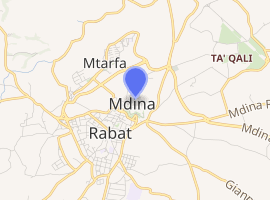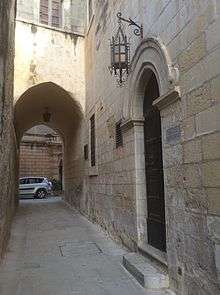Palazzo Santa Sofia
Palazzo Santa Sofia is a palace in Mdina, Malta, located in Villegaignon Street, across the square from the cathedral.[1] Its ground floor was built in 1233, and it is believed to be the oldest surviving building in the city. The upper floor is of a much later construction, being built in the 20th century.
| Palazzo Santa Sofia | |
|---|---|
Façade of Palazzo Santa Sofia | |

| |
| General information | |
| Status | Intact |
| Type | Palace |
| Architectural style | Medieval |
| Location | Mdina, Malta |
| Coordinates | 35°53′11.2″N 14°24′10.9″E |
| Current tenants | Fondazzjoni Patrimonju Malti |
| Construction started | 1233 |
| Renovated | 20th century |
| Owner | Private |
| Technical details | |
| Material | Limestone |
| Floor count | 2 |
History
The ground floor of Palazzo Santa Sofia was built in the 13th century, and the date 1233 is inscribed on the moulding of one of its windows.[2] The upper floor was built sometime after 1938.[3] The building was periodically rented and used as a school run by Roman Catholic nuns.[4]
Today, the palace is privately owned, and it is managed by a local heritage foundation Fondazzjoni Patrimonju Malti. It is not open to the general public,[3] although it can be hired for dinner or cocktail parties, lectures or other events.[5] The palace is scheduled as a Grade 1 national monument, and it is also listed in the National Inventory of the Cultural Property of the Maltese Islands.[2]
Architecture

Palazzo Santa Sofia originally had a single story, and was built around a central courtyard. The main doorway to the palace was originally through an arched passageway known as a siqifah, which led to the courtyard. The passageway was eventually converted into a narrow street called Triq Santa Sofia (Santa Sofia Street). The façade of the ground floor is rather plain, and it contains two doors with the passageway in between. A two-tiered palline losanghe cornice separates the ground floor from the first floor.[2] This cornice is similar to the one found at the nearby Palazzo Falson.[6]
The more recent upper floor is characterized by four ornate mullioned windows, and a one-tiered palline losanghe cornice is located at roof level. A number of coats of arms can be found on both floors of the façade.[2]
References
| Wikimedia Commons has media related to Palazzo Santa Sofia. |
- Richards, Brian (2008). Malta (5 ed.). London: New Holland Publishers (UK) Ltd. p. 84. ISBN 9781845378714.
- "Palazzo Santa Sofia" (PDF). National Inventory of the Cultural Property of the Maltese Islands. 28 December 2012. Archived from the original (PDF) on 18 January 2016.
- Rix, Juliet (2013). Malta and Gozo (2 ed.). Bradt Travel Guides. p. 220. ISBN 9781841624525.
- Cuschieri, Doreen (25 October 2010). "Sisters of Dorothy enter their first 100 years in Malta". Times of Malta. Retrieved 12 March 2016.
- "Private Events". Palazzo Falson Historic House Museum. Archived from the original on 18 January 2016.
- Busuttil, Claude (1999). "A Double Act for the 'Norman House': Palazzo Falzon or Palazzo Cumbo-Navarra?" (PDF). Melita Historica. 12 (4): 416. Archived from the original (PDF) on 18 January 2016.
